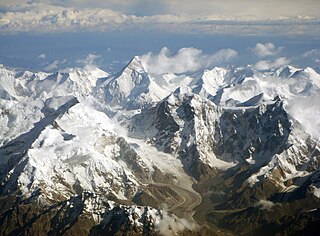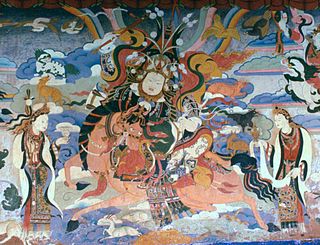
The Tian Shan, also known as the Tengri Tagh or Tengir-Too, meaning the Mountains of Heaven or the Heavenly Mountain or Mountains of God, is a large system of mountain ranges in Central Asia. The highest peak in the Tian Shan is Jengish Chokusu, at 7,439 metres (24,406 ft) high. Its lowest point is the Turpan Depression, which is 154 m (505 ft) below sea level.

Tengri is the all-encompassing God of Heaven in the traditional Turkic, Yeniseian, Mongolic and various other nomadic Altaic religious beliefs. Tengri is not considered a deity in the usual sense, but a personification of the universe. However, some qualities associated with Tengri as the judge and source of life, and being eternal and supreme, led European and Muslim writers to identify Tengri as a deity of Turkic and Mongolian people. According to Mongolian belief, Tengri's will (jayayan) may break its own usual laws and intervene by sending a chosen person to earth.

Edirne Province is a Turkish province located in East Thrace. Part of European Turkey, it is one of only three provinces located entirely within continental Europe. Edirne Province is bordered by Tekirdağ Province and Kırklareli Province to the east, and the Gallipoli peninsula of Çanakkale Province to the south-east. It shares international borders with Bulgaria to the north and Greece to the west.

Jengish Chokusu is the highest mountain in the Tian Shan mountain system at 7,439 metres (24,406 ft). It lies on the Kyrgyzstan–China border between the Ak-Suu District in the Issyk-Kul Region of far Eastern Kyrgyzstan and Wensu County, Xinjiang, China. It is part of the Kakshaal Too, the highest part of the Tian Shan and located southeast of lake Issyk Kul.
Bai-Ülgen or Ülgen is a Turkic creator-deity, usually distinct from Tengri but sometimes identified with him in the same manner as Helios and Apollo. His name is from Old Turkic bay, "rich", and ülgen, "magnificent". Ülgen is believed to be without either beginning or end.

Burkhanism or Ak Jang is an indigenist new religious movement that flourished among the Altai people of Russia's Altai Republic between 1904 and the 1930s. The Russian Empire was suspicious of the movement's potential to stir up native unrest and perhaps involve outside powers. The Soviet Union ultimately suppressed it for fear of its potential to unify Siberian Turkic peoples under a common nationalism.

Khan Tengri is a mountain of the Tian Shan mountain range. It is on the China—Kyrgyzstan—Kazakhstan tripoint, east of lake Issyk Kul. Its geologic elevation is 6,995 m (22,949 ft), but its glacial icecap rises to 7,010 m (22,999 ft). For this reason, in mountaineering circles, including for the Soviet Snow Leopard award criteria, it is considered a 7,000-metre peak.

Turkic mythology refers to myths and legends told by the Turkic people. It features Tengrist and Shamanist strata of belief along with many other social and cultural constructs related to the nomadic and warrior way of life of Turkic and Mongol peoples in ancient times. Turkic mythology shares numerous points in common with Mongol mythology. Turkic mythology has also been influenced by other local Asiatic and Eurasian mythologies. For example, in Tatar mythology elements of Finnic and Indo-European mythologies co-exist. Beings from Tatar mythology include Äbädä, Alara, Şüräle, Şekä, Pitsen, Tulpar, and Zilant.

Tengrism is an ethnic Turkic, Yeniseian, Mongolic religion originating in the Eurasian steppes based on shamanism and animism. It generally involves the titular sky god Tengri, who is not considered a deity in the usual sense, but a personification of the universe. According to some scholars, adherents of Tengrism view the purpose of life, to be in harmony with the universe.
Kazakhstan Temir Joly, also National Company Kazakhstan Temir Joly, is the national railway company of Kazakhstan.
"The City of Skulls" is a short story by American writers Lin Carter and L. Sprague de Camp, featuring the fictional sword and sorcery hero Conan the Cimmerian created by Robert E. Howard.

The Mongol mythology is the traditional religion of the Mongols.
Koyash is the god of sun in Turkic mythology.
The Kyrgyzstan Championship is the national ice hockey championship in Kyrgyzstan.

The Second Turkic Khaganate was a khaganate in Central and Eastern Asia founded by Ashina clan of the Göktürks that lasted between 682–744. It was preceded by the Eastern Turkic Khaganate (552–630) and the early Tang dynasty period (630–682). The Second Khaganate was centered on Ötüken in the upper reaches of the Orkhon River. It was succeeded by its subject Toquz Oghuz confederation, which became the Uyghur Khaganate.

This is a survey of the postage stamps and postal history of Prince Edward Island.
Tengri Qaghan was the sixth ruler of the Second Turkic Khaganate.










